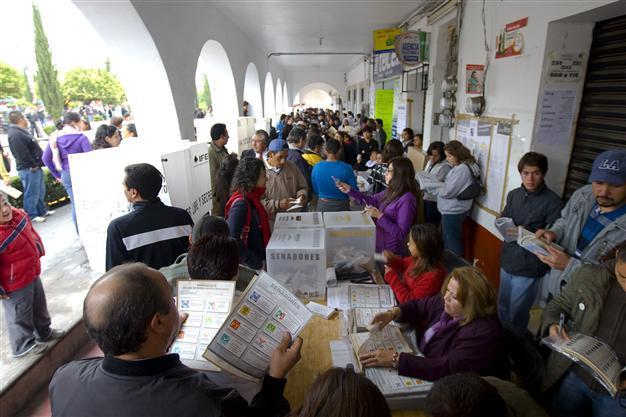Polls open in Mexican presidential election
MEXICO CITY - Agence France-Presse

General view of people queuing and voting at a polling station in Atlacomulco, State of Mexico, on election day on July 1, 2012. AFP photo
Polls opened Sunday in Mexico's presidential election, in which voters exhausted by violence seem prepared to bring the PRI, the party that ran the country for seven decades, back to office.Enrique Pena Nieto with the Institutional Revolutionary Party (PRI) has a healthy lead in pre-vote surveys over a leftist ex-Mexico City mayor who narrowly lost the last presidential election, and a female former cabinet minister from the unpopular President Felipe Calderon's conservative party.
The final surveys allowed by law, out Wednesday, showed Pena Nieto winning with 10-17 point a margin of victory. However runner-up Andres Manuel Lopez Obrador from the leftist Party of the Democratic Revolution (PRD) insists that his figures show that he can pull an upset victory.
Lopez Obrador lost in 2006 by less than one percent and claimed he was robbed of his victory. Weeks of mass protests followed, bringing Mexico City to a standstill.
Polls show Josefina Vazquez Mota from Calderon's National Action Party (PAN) in a distant third, with about 24 percent support, while Gabriel Quadri, a civil engineer representing a party created by the country's powerful teachers' union, has between two and four percent support.
Mexican presidents are elected by simple majority for six-year terms and are banned from running for re-election. Consecutive re-election is also banned in all other elected positions.
There is no run-off vote, meaning that a plurality of votes likely will be cast for someone other than the winner.
Mistrust in the electoral system runs high. Pre-vote surveys suggested that 40 percent of the nearly 80 million eligible voters will not bother to show up at the polls.
A survey out Friday by the Autonomous University of Mexico (UNAM) showed that 71 percent of Mexicans believe electoral fraud is possible.
Election officials have worked hard to convince skeptics that the balloting will be clean.
"This will be the most observed election day in our history," said Lorenzo Cordova, a top official at the independent Federal Electoral Institute (IFE).
Nearly one million Mexicans -- including IFE workers, volunteer citizens and party representatives -- as well as 700 international observers will be at polling stations across the country to oversee the vote.
Also on the ballot are 500 members of the Chamber of Deputies who serve for three years; 128 members of the senate, who serve for six years; and various mayoral and gubernatorial positions.
















